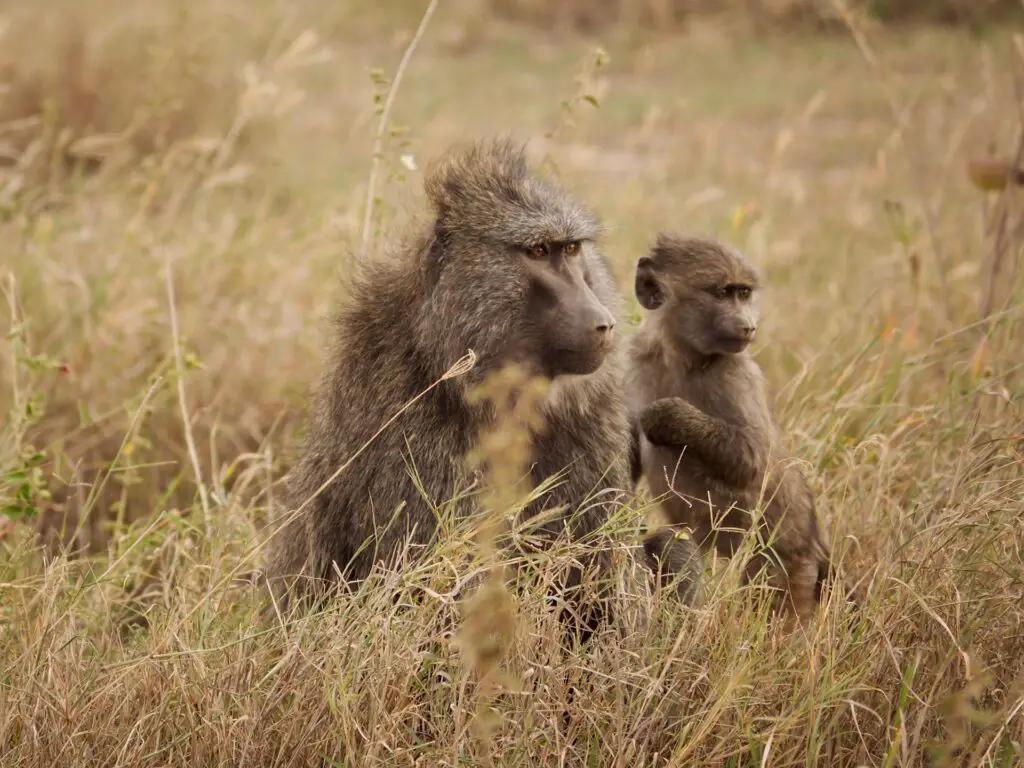Why do Baboons steal Lion cubs? Do Baboons raise Lion cubs?
Why do baboons steal lion cubs?
Instances of baboons stealing and taking away lion cubs have been reported very often in the wild due to the carelessness of the adult lions for their cubs.
Mostly in the Savannahs, it has been repeatedly witnessed that the lion cubs fall victim to groups of baboons.
It is has been reported that baboons steal lion cubs whenever they get a good chance to do so.
Baboons have been seen to grasp the cubs when they find one playing somewhere in front of the den while the mother lion isn’t there, and carry the cub up to the tree.
Young and Juvenile Baboons have been reported more often to steal lion cubs and playing with them.
They play and disturb the cubs so bad that the cubs can’t tolerate any more and die within a few hours or so.
Baboons have been also known to feed upon the cubs when they die after playing with them, or they carry the cubs up to the tree and feast on them by scratching and biting these little creatures.
Also that, lions are natural predators of baboons. So, baboons don’t skip getting their hands on the lion cubs if they find them alone, and this may be also the reason for them to decrease the upcoming predator count.
So, yes baboons do steal lion cubs to play with them and kill them later on. They are known for very aggressively playing with the cubs by throwing, dragging, scratching them whenever they get their hands on them.
Baboons see lion cubs as easy prey, so they may also opt to kidnap lion cubs when they are hungry and feast on it.

Why are lion cubs vulnerable to baboons?
Lion cubs are born blind and defenseless, and so they remain highly under the protection of their mother most of the time. Cubs remain blind for about a week after birth.
And, for about six to seven weeks they remain in strict custody of their mother and stay hidden from the rest of the pride.
Lioness generally keeps her cubs in the dens surrounded by thick bushes and vegetation for around six weeks until they are old enough to follow the pride.
So, due to these reasons, they are very vulnerable to a lot of predatory animals like hyenas, wild dogs, baboons, leopards, cheetah, etc. as easy prey.
Baboons are intelligent animals with good eyesight. They do know very well where a lioness can probably hide her cubs.
Baboons sneak peek at the moments of the cubs and the mother sitting atop the trees, and they wait for the best chance to get their hands on the cubs when the lioness is not there.
And, when the lioness and the rest of the pride members are not present near the cubs, maybe when they are out for hunting, then chances are very high that baboons may go near to the cubs and grasp them to take up to the trees if the cubs weren’t hidden well inside the dens.
Can a baboon kill an adult lion?
A single baboon won’t be able to kill an adult lion. In fact, if it tries to do so, then chances are at its peak that the lion itself will kill the baboon and prey upon it.
Lions have an advantage over baboons for having very large, heavy, powerful musculature with sharp claws, canines, and strong jaws that are just more than enough for an adult male Baboon to be killed.
So, a lion can win the fight with a baboon very easily and prey upon it due to its aggressive and more powerful nature.
And, baboons due to their adaptation to quickly and flexibly climb up the trees which lions can’t, help the baboons to stay protected from getting preyed upon by the lions.
Lions being nocturnal creatures with great night vision are good at killing the baboons when they encounter them on the ground at nighttime.
And that, many baboons will meet their end in terrifying nightly lion and leopard attacks. As because, it is not so easy for these big cats to hunt baboons during the daytime due to their quick tree climbing adaptability.
Adult and mature baboons can only get their hands on lion cubs when the lionesses and the lions are not there protecting the cubs.
Are lions scared of baboons?
Baboons are very social creatures and they are known to protect their group at all times from any upcoming danger.
They stay and roam in groups called troops, and a troop can contain somewhere between a dozen to hundreds of members.
A lion is just enough to kill an adult male baboon and prey upon it very easily if it can grab one into its powerful jaw. However, it can be very hard for them to go and threaten a baboon group with more than 20 members, with at least 10 powerful adult males.
Baboons are known to fight back if there’s any upcoming risk to their mates and infants from big cat species like lions. They are ready to do or die during the fight with a lion to protect their troop.
So, it has been seen that many of the lions won’t opt to attack a baboon if it is with a large troop with at least 10 powerful adult males for protection, or else the lion may itself be severely injured by the baboons.
So, in such a case, the lion may opt to go for a more easy kill like wildebeests, zebras, and antelopes in spite of going for the baboons. But, if the troop is noticeably small then the lion may take the chance to go after the baboons for a kill.
So yes, we can partially say that lions are scared of baboons with a large troop with at least 10 powerful adult baboons.
And, they won’t fear to attack if the baboon troop is considerably small as there will be very less risk and more preying chances.
Do baboons raise lion cubs?
Baboons don’t raise lion cubs. In fact, they will kidnap a cub, take it up to the trees, play with it, and will probably kill it to feast upon it.
Baboons that have encountered a lion, or have seen their near ones getting preyed upon by a lion won’t ever take the chance to raise lion cubs, as they better know that they will be inviting their own death after a few years if they do so.
Raising a lion cub will be like calling for their own death. As the lion cub will always see the baboon as a prey when it will grow up as it is its natural instinct to do so.
Recently in February 2020, a Safari guide Kurt Schultz filmed the rare sighting of a young baboon stealing and carrying a lion cub up to the trees and grooming it. And later, it took the cub away with the troop and soon disappeared into a thick bush.
This was filmed near Skukuza rest camp in South Africa’s Kruger National Park, and this made many people think if baboons do really raise lion cubs.
But, the fact is that baboons don’t raise lion cubs, or else the lion cubs will surely pose a threat to the baboons when they get older.
So, it’s very much unlikely that a baboon would show any kind of genuine affection towards a predator cub like the lion cub here in this case. And that, this wild animal would soon kill and feed upon the cub or simply leave it dead and move on.
Do baboons also steal leopard cubs?
Yes, baboons not only steal lion cubs but they are also known to steal leopard cubs as well.
They do the same with leopard cubs as they do with the lion cubs, i.e. they will steal them, play with them, and then, will kill them to feast on or will simply leave them dead and will move on.
In the case of lions, baboons can escape by climbing up the trees. But, in the case of leopards when they try to attack them baboons can’t escape by climbing up the trees.
This is because leopards are very good and flexible climbers. And, it is here to be noted that the African leopard is the main predator of baboons, and preys on it very often (mostly at night time when baboons’ night vision is extremely poor) by grabbing them into their deadly jaws after climbing up the trees.
And so, when baboons can get their hands on alone kept leopard cubs when the mother is not present at the moment, it will surely steal, kill, and eat them without showing any mercy on the predator’s cubs.
Normally, lions and leopards hide their cubs before they go hunting, but baboons can sneak peek at their every moment while sitting atop the tree.
And so, when the mother has gone out for the hunt baboons are likely to approach nearby the cubs, will search and find them out, and then they are much more likely to take them away from the dens to atop the tree.
